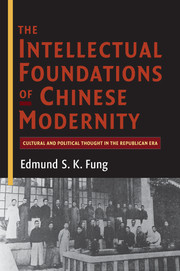 The Intellectual Foundations of Chinese Modernity
The Intellectual Foundations of Chinese Modernity Book contents
- Frontmatter
- Contents
- Acknowledgements
- Abbreviations
- A Note on Romanization
- Introduction
- 1 The Push of Westernized Radicalism
- 2 The Pull of Cultural Conservatism
- 3 The Politics of Modern Chinese Conservatism
- 4 Liberalism in China and Chinese Liberal Thought
- 5 The State, Government and the Rule of Law
- 6 The Rise of Reformist Socialist Thought
- 7 From State Socialism to Social Democracy
- Conclusion
- Glossary
- Selected Bibliography
- Index
- References
Conclusion
Published online by Cambridge University Press: 03 May 2010
- Frontmatter
- Contents
- Acknowledgements
- Abbreviations
- A Note on Romanization
- Introduction
- 1 The Push of Westernized Radicalism
- 2 The Pull of Cultural Conservatism
- 3 The Politics of Modern Chinese Conservatism
- 4 Liberalism in China and Chinese Liberal Thought
- 5 The State, Government and the Rule of Law
- 6 The Rise of Reformist Socialist Thought
- 7 From State Socialism to Social Democracy
- Conclusion
- Glossary
- Selected Bibliography
- Index
- References
Summary
This study has examined three interrelated strands of thought in the Republican era, each a response to the ‘crisis of modernization’, and together, they formed the intellectual foundations of Chinese modernity. The non-Marxist elite in this study were a kind of mainstream intellectuals who were critical of laissez-faire economics, liberal capitalism and extreme individualism, being reformist and not that leftist on the whole. Many held liberal, conservative and socialist ideas simultaneously or at different times, ideas that represented different visions of modernity and yet were formed within a framework of common concepts of the age. Common concerns about the national crisis drove them to grapple with the same or similar questions concerning Chinese culture, state and society. As they interacted, they influenced one another in the discourse on modernity. By taking an integrated approach to exploring liberal, conservative and socialist thought, this study has revised the way we see the intellectuals whose ideas are sometimes far too nuanced to fit neatly under a particular banner.
Modernity is multilayered, internally complex and entails a criticism of modernity itself. It is from this perspective that this study has, first of all, probed the thought of the Westernizers and their critics in terms of cultural radicalism and cultural conservatism. The Westernizers identified themselves with Enlightenment modernity, influenced as they were by evolutionary theory and ideas of progress.
- Type
- Chapter
- Information
- The Intellectual Foundations of Chinese ModernityCultural and Political Thought in the Republican Era, pp. 256 - 268Publisher: Cambridge University PressPrint publication year: 2010


